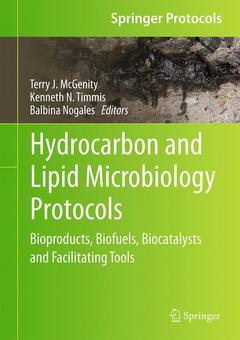Hydrocarbon and Lipid Microbiology Protocols, Softcover reprint of the original 1st ed. 2017 Bioproducts, Biofuels, Biocatalysts and Facilitating Tools Springer Protocols Handbooks Series

This Volume covers protocols for various applications in hydrocarbon microbiology, including those of interest for industrial processes, biocatalysis, lipid and biofuel production, bioproducts, or the human microbiome. It presents detailed protocols for the functional screening of enzymes acting on greasy molecules (i.e. lipases, esterases), including assays for enantioselective biocatalysts, as well as approaches for protein display technologies. Protocols for improving fuel quality and production of biofuel and lipids in different hosts (bacteria, algae, yeast) are also provided. The production of biogas from organic waste and its fermentation into value-added products such as polyhydroxyalkanoates is covered, as well as an in-vitro model of the gut microbiome for short-chain fatty acid metabolism and microbial diversity analyses. The applications presented are examples of the many potential applications in hydrocarbon and lipid microbiology, and many (i.e. protein-display technologies) will also be of interest in other research fields.
Hydrocarbon and Lipid Microbiology Protocols
There are tens of thousands of structurally different hydrocarbons, hydrocarbon derivatives and lipids, and a wide array of these molecules are required for cells to function. The global hydrocarbon cycle, which is largely driven by microorganisms, has a major impact on our environment and climate. Microbes are responsible for cleaning up the environmental pollution caused by the exploitation of hydrocarbon reservoirs and will also be pivotal in reducing our reliance on fossil fuels by providing biofuels, plastics and industrial chemicals. Gaining an understanding of the relevant functions of the wide range of microbes that produce, consume and modify hydrocarbons and related compounds will be key to responding to these challenges. This comprehensive collection of current and emerging protocols will facilitate acquisition of this understanding and exploitationof useful activities of such microbes.
Introduction.- Genetic enzyme screening system: a method for high-throughput functional screening of novel enzymes from metagenome libraries.- Functional screening of metagenomic libraries: enzymes acting on greasy molecules as study case.- Screening for Enantioselective Lipases.- Use of bacterial polyhydroxyalkanoates in protein display technologies.- Bacterial Secretion Systems for Use in Biotechnology:Autotransporter-Based Cell-Surface Display and Ultra-High Throughput Screening of Large Protein Libraries.- Protocols for the isolation and preliminary characterization of bacteria for biodesulfurization and biodenitrogenation of petroleum-derived fuels.- Syngas fermentation for polyhydroxyalkanoate production in Rhodospirillum rubrum.- Genetic strategies on Kennedy pathway to improve triacylglycerol production in oleaginous Rhodococcus strains.- Production of biofuel-related isoprenoids derived from Botryococcus braunii algae.- Protocols for monitoring growth and lipid accumulation in oleaginous yeasts.- Protocol for start-up and operation of CSTR biogas processes.- Protocols for the use of gut models to study the potential contribution of the gut microbiota to human nutrition through the production of short chain fatty acids.- Protocol for the application of bioluminescence full-cell bioreporters for monitoring of terrestrial bioremediation.
Date de parution : 12-2016
Ouvrage de 245 p.
17.8x25.4 cm
Date de parution : 07-2018
Ouvrage de 245 p.
17.8x25.4 cm



